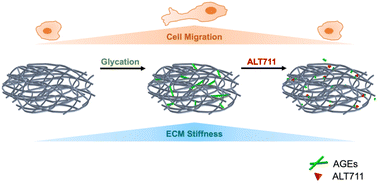AGE-breaker ALT711 reverses glycation-mediated cancer cell migration†
Abstract
Diabetes is associated with increased risk of breast cancer and worse prognoses for cancer patients. Hyperglycemia can result in increased glycation, the process wherein crosslinkages are formed between sugars and extracellular matrix (ECM) proteins through the formation of advanced glycation endproducts (AGEs). Although accumulation of AGEs occurs naturally in vivo over time, it is greatly accelerated by the hyperglycemic environment of diabetic patients. AGE accumulation has been linked to stiffening-related diseases such as hypertension, cancer metastasis, and neurodegenerative disorders. In response, several AGE-inhibiting and AGE-breaking drugs have received significant attention for their ability to reduce AGE accumulation. The resulting effects of these drugs on cell behavior is not well understood. In this study, we measured cancer cell migration in glycated collagen with and without the AGE-breaking drug alagebrium chloride (ALT711) to investigate the drug's ability to disrupt ECM crosslinks and reduce tumor cell spreading, contractility, and migration. The mechanical properties and chemical composition of collagen glycated with increasing concentrations of glucose with and without ALT711 treatment were measured. Increasing glucose concentration resulted in increased AGE accumulation and matrix stiffness as well as increased cancer cell contractility, elongation, and migration. Treatment with ALT711 significantly lowered AGE accumulation within the collagen, decreased collagen stiffness, and reduced cell migration. These findings suggest that while hyperglycemia can increase collagen matrix stiffness, resulting in increased breast cancer cell migration, an AGE-breaker can reverse this phenotype and may be a viable treatment option for reducing cancer cell migration due to glycation.

- This article is part of the themed collection: Soft matter aspects of cancer


 Please wait while we load your content...
Please wait while we load your content...